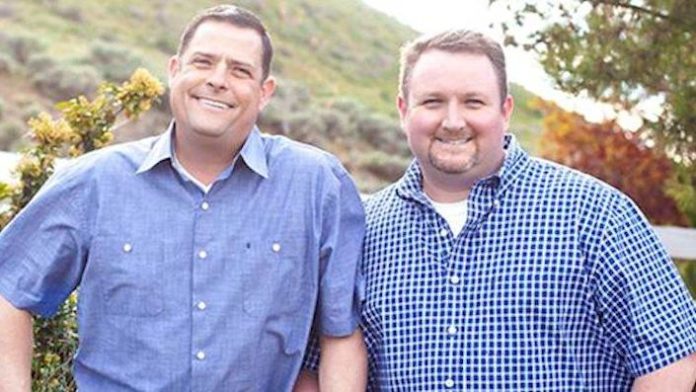
Barronelle Stutzman, the Washington State florist who was sued over refusing to serve a gay couple’s wedding, has withdrawn her appeal to the U.S. Supreme Court.
Stutzman announced Thursday that she is ending her case and will pay a $5,000 settlement to the couple, which they plan to donate to a local PFLAG chapter, adding $5,000 of their own.
The Supreme Court had already declined, in July, to hear Stutzman’s case, after state courts had ruled that she violated Washington’s antidiscrimination law. But she and her lawyers from the anti-LGBTQ+ group Alliance Defending Freedom had asked the high court to reconsider. She has now ended that effort, she announced in a letter on the ADF website.
In 2013, Stutzman, owner of Arlene’s Flowers in Richland, turned down longtime customer Robert Ingersoll’s request to provide floral arrangements for his wedding to Curt Freed. Although she describes Ingersoll as a “dear friend,” she said she could not work on his wedding because of her Christian beliefs.
“It’s hard to believe that so many years have passed since my dear friend Rob came into my flower shop and asked me to do something I’d done many times before: design a unique, personalized arrangement of flowers to celebrate a special event in his life,” she wrote. “I had always been delighted with those creative opportunities, just as I’d always been happy to sell him bouquets of flowers. But this time, the special event he was celebrating was his marriage to another man. And that was a line I could not cross, even for friendship.
“I am a Christian, and I believe the Bible to be the Word of God. That Word makes it clear that God loves all people so much that He sent His Son to die in their place. And it also teaches that He designed marriage to be only the union of one man and one woman. I could not take the artistic talents God Himself gave me and use them to contradict and dishonor His Word.”
Stutzman said she has been “persecuted” and a victim of “intolerance.” “At one point, those aligned against me suggested that I could keep my shop if I paid a fine and promised to create custom designs for same-sex ceremonies in the future,” she wrote. “I refused because I could not betray my conscience. I also worried about what kind of precedent my ‘paying up’ would set for others facing similar circumstances. But I am willing to turn the legal struggle for freedom over to others. At age 77, it’s time to retire and give my business to someone else.”
Those carrying on the “legal struggle,” she noted, include Lorie Smith, a web designer in Colorado. Smith filed suit preemptively in 2016, challenging her state’s antidiscrimination law because she feared it would force her to create wedding websites for same-sex couples, in violation of her religious beliefs. She had not at the time received any requests for such sites. Smith has so far lost in court, and she has asked the Supreme Court to review her case.
The high court has ruled narrowly in cases involving conflicts between LGBTQ+ rights and religious freedom. In 2018, in Masterpiece Cakeshop v. Colorado Civil Rights Commission, it ruled in favor of Masterpiece owner Jack Phillips, who had been penalized by the commission for refusing to make a wedding cake for a same-sex couple. The commission held that he had violated the state’s antidiscrimination law. The Supreme Court vacated the commission’s ruling against him, saying the body had shown insufficient respect for his religious beliefs, but it did not find a broad right to discriminate.
This year the court ruled in a case involving the city of Philadelphia, which ended its contract with a Catholic social services agency that had handled foster care placements for the city because the agency wouldn’t certify same-sex couples as foster parents. That violated Philadelphia’s antidiscrimination ordinance. But the court ruled that the agency could continue to work for the city because there was a provision for exceptions to the ordinance. Again, it did not rule for a general right to discriminate.
With the end of Stutzman’s case, rulings by Washington State courts, including its Supreme Court, that there is not a right to discriminate, will stand, the American Civil Liberties Union of Washington noted. The ACLU had represented Ingersoll and Freed, who released a statement through the organization celebrating the settlement.
“We took on this case because we were worried about the harm being turned away would cause LGBTQ people,” they said, according to the Tri-City Herald. “We are glad the Washington Supreme Court rulings will stay in place to ensure that same-sex couples are protected from discrimination and should be served by businesses like anyone else.”
“We are also pleased to support our local PFLAG’s work to support LGBTQ people in the Tri-Cities area,” they continued. “It was painful to be turned away and we are thankful that this long journey for us is finally over.”
Stutzman had been sued separately by the Washington attorney general for violating the state’s Consumer Protection Act by discriminating against the couple. In accordance with a local court ruling, she had already paid a $1,000 penalty to the state plus $1 in court costs.
“We are pleased to hear that Arlene’s Flowers and Barronelle Stutzman have reached a settlement agreement with the couple they refused to serve,” Attorney General Bob Ferguson told the Herald via email. “The state is not a party to the settlement, and Arlene’s Flowers has already paid the $1,001 it owed the state. But we welcome this resolution, which preserves two unanimous victories at the state Supreme Court and ensures that LGBTQ+ Washingtonians are free of the indignity and harm of being turned away on the basis of whom they love.”








